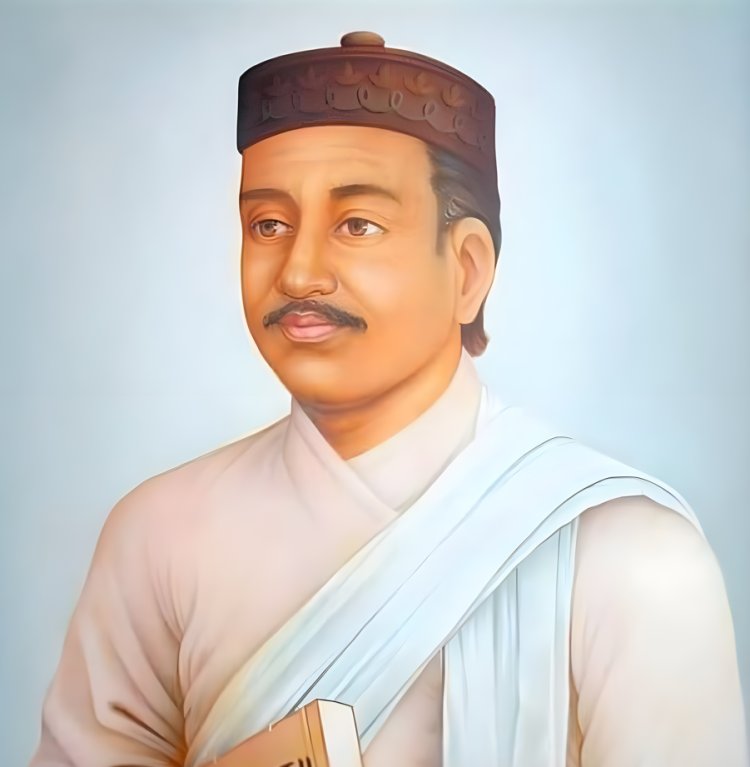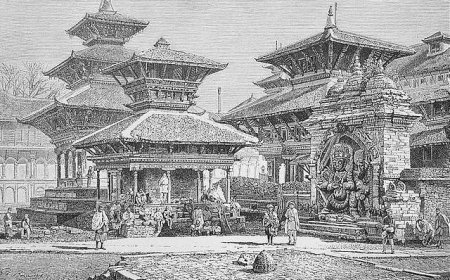Bhanu Bhakta Acharya: The Luminary of Nepali Literature
Explore the life, works, and enduring legacy of Bhanu Bhakta Acharya, the renowned Nepali poet and the pioneer of Nepali literature. Discover his selflessness, literary milestones, and the profound impact he had on Nepal's cultural identity.

Introduction
In the kaleidoscope of Nepali literature, one name stands out as a shining star, illuminating the path of culture, language, and identity. Bhanu Bhakta Acharya, born on July 13, 1814, in the picturesque village of Chundi Ramgha in Tanahun district, Nepal, is a name synonymous with literary eminence. His contributions have transcended time and continue to resonate, providing a testament to the enduring legacy of a man whose words breathed life into the Nepali language. In this comprehensive exploration, we delve into the life, works, and profound influence of Bhanu Bhakta Acharya, who not only bridged the linguistic diversity of Nepal but also emerged as a symbol of selflessness and cultural richness.
A Lesson in Selflessness: The Grass Cutter's Impact
Bhanu Bhakta Acharya's journey was shaped not just by his literary pursuits but also by a serendipitous encounter that left an indelible mark on his soul. In observing a humble grass cutter laboring by the roadside, he learned a lesson in selflessness. The grass cutter's dedication to serving his community, even at the cost of his own comfort, was a powerful revelation for Acharya. It inspired him to write the poignant "Ghansi" poem, which emphasized the value of simplicity and selflessness, questioning the worth of his own affluence in the light of such noble acts.
The Literary Milestone: Translating the Ramayana
Bhanu Bhakta Acharya's most celebrated contribution is the translation of the Ramayana into the common Nepali language. In his time, Sanskrit held literary dominance, limiting access to a select few. Bhanu Bhakta's translation was not just a linguistic achievement; it was a cultural watershed that made this revered epic accessible to the masses. Rendering the epic in poetic form, he preserved its lyrical essence and inner meaning. His translation breathed new life into the Nepali language, providing a cultural touchstone that united a diverse nation.
Literary Contributions Beyond the Ramayana
While the translation of the Ramayana is a cornerstone of his legacy, Bhanu Bhakta Acharya's literary contributions extend far beyond this monumental work.
Celebrating Kathmandu Valley: "Kantipuri Nagari"
In "Kantipuri Nagari," Acharya lavishly praised the Kathmandu Valley and its inhabitants. His vivid verses painted a colorful picture of the valley's beauty and the warmth of its people. This poem is an ode to the cultural and historical richness of the Kathmandu Valley, offering a poetic lens into one of Nepal's most iconic regions.
A Garland of Devotion: "Bhakta Mala"
"Bhakta Mala" explores themes of devotion and spirituality. In this work, Bhanu Bhakta Acharya delves into the depths of religious sentiment, providing readers with a glimpse into the spiritual tapestry that defines Nepali society. His ability to convey profound religious ideas in a simple yet evocative manner is a testament to his literary prowess.
Poetry as a Medium of Devotion: "Roj Roj Darshan Paunchhu"
"Roj Roj Darshan Paunchhu," often referred to as "Bholi Kabita," captures the essence of devotion. Through verses like these, Acharya connects with the spiritual and cultural sentiments of the Nepali people, forging a profound bond with his readers.
The Letter from Prison: An Act of Artistic Freedom
During a period of incarceration resulting from a misunderstanding, Bhanu Bhakta Acharya displayed his artistic ingenuity. He composed a compelling petition in verse form, addressed to the Rana prime minister, pleading for his freedom. This poetic plea not only secured his release but also earned him a financial reward, highlighting his profound connection with words.
A Life of Significance: "Aadikavi"
The title "Aadikavi" aptly bestowed upon Bhanu Bhakta Acharya acknowledges his pioneering role as the first poet in Nepal to write in the common Nepali language. Although he wasn't the first poet in the nation's history, he was the first to break away from the dominion of Sanskrit and pave the way for others to follow. This title, first used by Motiram Bhatta in his biography, underscores the significance of Acharya's contributions to Nepali literature.
An Enduring Legacy: A National Hero
In 1955, a national commission led by renowned playwright Bal Krishna Sama declared Bhanu Bhakta Acharya as one of Nepal's "rashtriya bibhutis" or national heroes. This honor cements his status as an icon of Nepali culture and literature. His recognition as a national hero underscores the profound impact he had on the nation's identity.
Commemorating a Legacy: Bhanu Jayanti
To celebrate his enduring contributions to Nepali literature, people around the world observe Bhanu Jayanti on his birthday. This cultural festival, occurring on the 29th day of the Nepali month of Ashadh (generally on July 13), is a testament to the lasting legacy of Bhanu Bhakta Acharya. The day is marked by literary seminars, programs, and a remarkable presence of Nepalese writers, novelists, and literary enthusiasts. These celebrations are not just occasions of remembrance but also opportunities to keep his legacy alive and inspire future generations.
Conclusion
Bhanu Bhakta Acharya's life and literary contributions have left an indelible mark on the cultural fabric of Nepal. His translation of the Ramayana, the poetic beauty of his verses, and his selflessness in the face of prosperity have shaped not only the Nepali language but also the spirit of a diverse nation. As the "Aadikavi" and a national hero, Bhanu Bhakta Acharya remains an eternal source of inspiration for writers, poets, and all those who cherish the rich tapestry of Nepali literature and culture. His words continue to resonate as a guiding light, reminding us of the power of literature to unify, inspire, and transcend time.
What's Your Reaction?





































































































